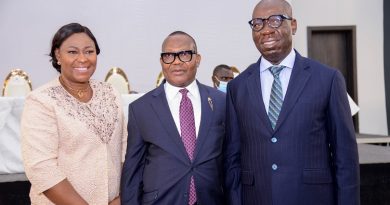Kwibuka 29: Lighting A Candle For Every Life Lost, Reason Rwanda Is Observing A Work Free Day On Good Friday


The Oasis Reporters
April 7, 2023
@Theoasisreport1
@gregabolo

A non-Rwandan who observes that a day like today being Good Friday and a work free day, would think that the citizens of the country are observing the Christian holiday. Such a person would be forgiven for a lack of knowledge about the significance of the day.
At Access Bank, we stand with all Rwandans in the 29th commemoration of the 1994 Genocide against Tutsi. We light a candle for every life lost! #NeverAgain#Kwibuka29 #RememberUniteRenew pic.twitter.com/vrXEjEGYtS
— Access Bank (Rwanda) PLC (@accessbankrw) April 7, 2023
Rwandans are commemorating today as Kwibuka, a day that is set aside to remember the millions of ethnic Tutsis and moderate Hutus who were killed in an orgy of genocidal massacres by a group that called themselves Intarahangwe, meaning the group that acts together.

The ugly event happened in 1994, twenty nine years ago. Hence the event is tagged Kwibuka29.

The Management and Staff of @accessbankrw Plc stand with all Rwandans to mark the 29th commemoration of the 1994 Genocide against the Tutsi. #Kwibuka29 pic.twitter.com/7Mhw16BJTT
— The New Times (Rwanda) (@NewTimesRwanda) April 7, 2023
The genocide continued on for several weeks into months until a group of Rwandan exiles based in Uganda successfully invaded their own home country even though many of the rebels were born in exile and had never set foot on Rwandan soil since birth or since childhood.
The minority Tutsi tribe had lived with the majority Hutu tribe in the country of Rwanda, a tiny East African nation for centuries with the Tutsis as ruling class, until an uprising arose and the majority Hutu ethnic tribe rose against the Tutsi and a painful race into exile happened for the fleeing Tutsis who desperately needed to protect their lives after losing thousands of them.
Life in exile as refugees for the Tutsis in their country of refuge, was exactly what it was, deeply dissatisfying for the Tutsis who dreamt of one day going back to their home country.
Many of the Tutsis joined the rebels of Uganda whose intention was to overthrow the military dictatorship of Field Marshal Idi Amin Dada. The group led by current president, Yoweri Museveni succeeded in their avowed task.
The spin-off was that the Rwandan Tutsis who were a part of the rebel army gained considerable expertise in military operations.
Consequently, they launched out one day to invade their home country. The knowledge of this infuriated the Hutus who formed the Intarahangwe militia that commenced the unbridled massacre of ethnic Tutsis living in their country of birth. Unfortunately, the global community could not stop the hate filled genocide that tore at the conscience of the world.
The killings continued until the invading Rwandan Patriotic Front arrived and the Hutu based Intarahangwe militia fled into exile.
The Rwandan army dropped their guns and fled in an undisciplined manner into Democratic Republic of Congo and in other directions, so also did the Intarahangwe militia.

The Tutsi leadership led by Paul Kagame has tried to do justice to nationhood by trials, forgiveness, reconciliations and the building of a united Rwanda, hence tribal identities remain an offense in the country. The new identity of the people is now Rwandan. A Rwandan would appear offended if asked to name his or her ethnic identity. ‘Just say Rwandan!’
What happened in Rwanda is serving as a grimly but soft reminder to the political warriors in Lagos State who are all claiming to be Lagosians because of their shared ethnicity in the South West. Genocide preventive indictments are being prepared at the Hague to preemptively stifle rhetorics that may snowball into genocide if left unchecked, Especially as Political thugs are forcefully preventing federal citizens from casting their vote.
Greg Abolo
gregabolo@gmail.com














